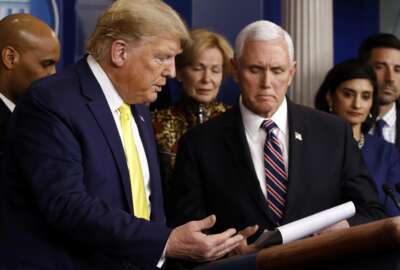This story was updated on Monday, March 16, 2020 at 2:15 p.m. to reflect an additional update from the American Federation of Government Employees.
The Office of Management and Budget has asked agencies in the national capital region to offer telework to all eligible employees, in light of the rapidly evolving coronavirus pandemic.
Though not a mandate or direct order, OMB’s new guidance, issued Sunday evening, uses the strongest language yet in response to COVID-19, the illness caused by the current strain of the coronavirus.
“We encourage agencies to use all existing authorities to offer telework to additional employees, to the extent their work could be telework enabled,” Russell Vought, OMB’s acting director, said Sunday night. “If employees are not eligible for telework, agency heads have the discretion to offer weather and safety leave, or the agency’s equivalent, including for employees who may not have been considered ‘at higher risk.'”
OMB’s latest guidance also triggered an operating status change from the Office of Personnel Management. The government’s operating status in the national capital region went from “green” to “yellow,” indicating that federal offices were open but with “maximum telework flexibilities to all current telework eligible employees, pursuant to direction from agency heads.”
“Please contact your supervisor to confirm telework schedule and to receive further direction from your agency head,” the operating status reads. “If you are not telework eligible or do not have access to telework equipment, please contact your supervisor to discuss next steps.”
The guidance only pertains to federal employees in the national capital region. And it still leaves telework up to each agency’s discretion, “consistent with operational needs of the departments and agencies as determined by their heads.”
OMB’s Sunday night memo comes on the heels of separate guidance the agency issued Thursday, which instructed all departments to use telework for federal employees at “higher risk” for the coronavirus.
According to the Centers for Disease Control and Prevention, those populations include older federal employees and those with underlying health conditions such as high blood pressure, heart disease, diabetes, lung disease or compromised immune systems.
To date, agencies have taken a wide range of approaches to telework during the past week. The Securities and Exchange Commission, for example, asked all employees in the Washington, D.C. headquarters to work from home after the agency suspected an employee may have the coronavirus.
In contrast, the Social Security Administration on Friday loosened its controversial telework policy in light of the coronavirus — but only for some employees. The recent policy change means SSA employees are back to teleworking one or two days a week depending on their component, but not full time.
Agencies could, as mentioned in prior OPM guidance on the coronavirus, tap into a wide variety of existing authorities to order all telework-eligible employees to work remotely during a pandemic.
They could, for example, invoke their own continuity of operation plans (COOP) during a pandemic, in which case the COOP would supersede any existing telework policy.
Agencies could also invoke what’s called an evacuation payment authority, which would allow “an agency to order its employees to evacuate their regular work sites and work from home (or an alternative location mutually agreeable to the agency and the employee) during a pandemic health crisis,” according to OPM guidance on COVID-19.
Under this authority, agencies could even order employees who aren’t on a telework agreement to work from home during a World Health Organization-declared pandemic.
OMB on Saturday urged agencies to avoid all non-mission critical travel.
“Only mission-critical travel is recommended at this time,” Vought wrote in a March 14 memo to agencies. “Heads of all executive departments and agencies are authorized to determine what travel meets the mission-critical threshold.”
Specifically, agencies should consider whether planned travel can be postponed, canceled or accomplished remotely.
Only travel that’s essential to preserve life and property, promote national security or required by law or contract should continue, OMB said.
The American Federation of Government Employees on Monday said OMB’s guidance still “didn’t go far enough” and left out the remaining 85% of the federal workforce who lives outside the national capital region.
“The administration needs to take more direct action to protect federal employees and the public they serve by immediately ordering all federal employees nationwide to telework if they work they do can be accomplished at home,” Everett Kelley, AFGE’s national president said in a statement. “This also means ensuring that employees have the equipment they need to do their work remotely.”
Copyright
© 2024 Federal News Network. All rights reserved. This website is not intended for users located within the European Economic Area.
